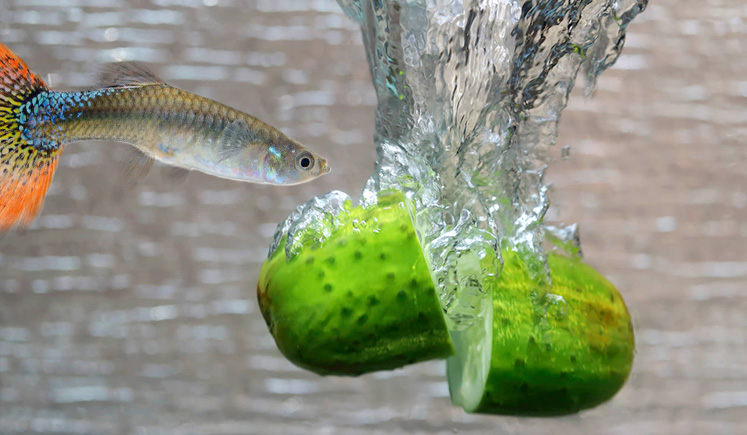Guppies do eat plants, but they prefer algae and soft, tender plant parts. They are mainly omnivores.
Guppies are popular aquarium fish known for their vibrant colors and ease of care. They thrive in various environments and have a diverse diet. While they do consume plant material, they primarily feed on algae, small invertebrates, and commercially prepared fish food.
Their tendency to nibble on plants can sometimes lead to damage, especially if the plants are soft and delicate. To maintain a balanced diet for guppies, it is essential to provide them with a mix of plant-based and protein-rich foods. This ensures their overall health and vibrant appearance, making them a delightful addition to any home aquarium.

Credit: www.youtube.com
Introduction To Guppies
Guppies are small, colorful fish. They are popular with aquarium enthusiasts. Their vibrant colors and active behavior make them a favorite. Guppies are easy to care for and are very hardy. They can adapt to many different environments.
Guppy Characteristics
Guppies are small fish, usually 1.5 to 2.5 inches long. Males are smaller but more colorful than females. They have fan-shaped tails and various color patterns. Guppies are livebearers, meaning they give birth to live young.
| Characteristic | Details |
|---|---|
| Size | 1.5 to 2.5 inches |
| Color | Various vibrant colors |
| Tail Shape | Fan-shaped |
| Reproduction | Livebearers |
Habitats And Behavior
Guppies thrive in freshwater environments. They prefer warm water between 72-82°F. They are social fish and do well in groups. Guppies are active swimmers and explore their surroundings constantly.
- Freshwater environments
- Warm water (72-82°F)
- Social and group-friendly
- Active swimmers
Guppies are omnivores. They eat both plant and animal matter. They enjoy a varied diet for good health. This includes plant material, algae, and small insects.
Diet Of Guppies
Guppies are vibrant, small fish loved by many aquarium enthusiasts. Understanding their diet is crucial for their health and longevity. Let’s explore what guppies eat both in the wild and in captivity.
Natural Diet
In the wild, guppies have a diverse diet. They consume various food sources to meet their nutritional needs.
- Algae: Guppies nibble on algae growing on rocks and plants.
- Insects: Small insects and larvae are part of their diet.
- Plant Matter: Guppies eat soft plant matter found in their environment.
- Zooplankton: Tiny aquatic organisms are a favorite snack.
Diet In Captivity
In an aquarium, guppies have a different diet. Their meals are often more controlled and varied.
| Food Type | Description |
|---|---|
| Flake Food | Specially formulated for guppies, rich in nutrients. |
| Pellets | Small and easy to eat, often used for feeding. |
| Frozen Food | Includes brine shrimp and bloodworms, great for protein. |
| Live Food | Live brine shrimp or mosquito larvae, highly nutritious. |
| Vegetables | Blanched spinach or lettuce, provides fiber. |
It’s essential to provide a balanced diet. This ensures guppies stay healthy and vibrant.
Plant Consumption By Guppies
Guppies are popular freshwater fish known for their vibrant colors. They are often kept in home aquariums. One common question is whether guppies eat plants. Understanding their diet can help you maintain a balanced aquarium.
Do They Eat Plants?
Guppies are omnivores, meaning they eat both plants and animals. They do nibble on plants, but they do not rely on them as their main food source. In a well-fed aquarium, plant nibbling is usually minimal.
Types Of Plants Consumed
Guppies may nibble on various types of plants in the aquarium. Some plants are more susceptible to being eaten by guppies. Here are some common plants they might consume:
- Java Moss: Easy to grow and often nibbled by guppies.
- Duckweed: Small floating plant, sometimes eaten by guppies.
- Anacharis: Hardy plant, but guppies may nibble on its leaves.
| Plant Type | Susceptibility to Nibbling |
|---|---|
| Java Moss | High |
| Duckweed | Medium |
| Anacharis | Low |
While guppies may nibble on plants, they rarely destroy them. Providing a balanced diet ensures your plants stay mostly intact. Feeding your guppies a mix of flakes, pellets, and live food can reduce plant nibbling.
Benefits Of Plants In Aquariums
Plants play a vital role in aquariums. They offer numerous benefits for fish and the tank environment. Guppies often interact with plants in their habitat. Understanding these benefits can help you create a healthier aquarium.
Health Benefits
Plants improve water quality. They absorb harmful chemicals like ammonia and nitrates. This keeps the water clean and safe for guppies. Clean water helps guppies stay healthy and active.
Plants provide shelter for guppies. They offer hiding spots to reduce stress. Less stress means healthier fish. Guppies feel safe and secure among plants.
Plants produce oxygen during photosynthesis. This increases oxygen levels in the water. High oxygen levels are vital for guppy health. Fish breathe easier and stay more active.
Environmental Impact
Plants create a natural habitat. They mimic the guppies’ wild environment. This makes the aquarium feel more like home for the fish. A natural setting promotes better behavior and activity.
Plants help control algae growth. They compete with algae for nutrients. Less algae means a cleaner tank. A clean tank is easier to maintain and looks better.
Plants support the tank’s ecosystem. They host beneficial bacteria. These bacteria break down waste. This process keeps the water clean and balanced.
| Benefit | Description |
|---|---|
| Water Quality | Plants absorb harmful chemicals. |
| Shelter | Plants provide hiding spots. |
| Oxygen Levels | Plants produce oxygen. |
| Natural Habitat | Plants mimic the wild environment. |
| Algae Control | Plants compete with algae for nutrients. |
| Tank Ecosystem | Plants host beneficial bacteria. |
Potential Issues
Guppies are popular aquarium fish. They are colorful and active. But, they can cause some issues in planted tanks. Understanding these issues helps maintain a healthy tank.
Overconsumption
Guppies sometimes eat too many plants. They may overgraze on delicate plants. This can lead to plant depletion. Guppies enjoy nibbling on soft leaves and shoots. If plants are not replenished, they may disappear. A balanced diet helps reduce this issue.
Plant Damage
Guppies can cause physical damage to plants. They nibble on leaves, causing holes and tears. This weakens the plant structure. Damaged plants may not grow well. Some plants are more vulnerable than others. Soft-leaved plants like mosses are often affected. Hardy plants like Java Ferns are more resistant.
| Plant Type | Vulnerability |
|---|---|
| Java Moss | High |
| Java Fern | Low |
| Amazon Sword | Medium |
To protect plants, offer guppies a varied diet. Include vegetables and algae in their meals. This reduces their need to nibble on tank plants.

Credit: www.reddit.com
Choosing Aquarium Plants
Choosing the right plants for your guppy aquarium is essential. Plants not only beautify the tank but also provide hiding spots for guppies. Some plants are more suitable for guppies because they do not eat them. Let’s explore some plant options.
Guppy-friendly Plants
Guppies love swimming around certain plants. These plants are safe and enjoyable for them.
- Anubias: These sturdy plants are hard for guppies to nibble.
- Java Fern: This plant has tough leaves, making it guppy-proof.
- Cryptocoryne: Another strong plant that guppies won’t eat.
Non-edible Plants
Some plants are not eaten by guppies due to their tough nature.
| Plant Name | Reason |
|---|---|
| Amazon Sword | Large and strong leaves |
| Hornwort | Fast-growing and too tough |
| Water Wisteria | Thick stems and leaves |
These plants are perfect for any guppy aquarium. They ensure a vibrant and safe environment for your fish.
Balancing Diet And Plant Life
Guppies are colorful and lively fish. They are popular in home aquariums. Many aquarists wonder if guppies eat plants. The answer is yes. Guppies nibble on plants. But they don’t rely on them for food. They need a balanced diet. Let’s explore how to balance their diet and maintain plant health.
Supplementing Diet
Guppies need more than just plants. They eat a variety of foods. Here are some options:
- Flake Food: A staple for guppies. It offers essential nutrients.
- Frozen Food: Items like brine shrimp and bloodworms. They provide protein.
- Live Food: Daphnia and baby brine shrimp. They stimulate natural hunting behaviors.
- Vegetables: Blanched spinach or zucchini. These add fiber to their diet.
Offering these foods ensures guppies get a balanced diet. It reduces their need to nibble on plants.
Maintaining Plant Health
Healthy plants contribute to a thriving aquarium. Here are tips to maintain plant health:
- Choose Hardy Plants: Java fern and Anubias. They are less likely to be eaten by guppies.
- Provide Adequate Light: Ensure plants get enough light. It helps them grow strong.
- Use Fertilizers: Liquid fertilizers add essential nutrients for plant growth.
- Trim Regularly: Prune plants to remove dead or decaying leaves.
These steps help keep plants healthy and vibrant. A healthy environment benefits both guppies and plants.

Credit: guppyaquarium.com
Conclusion
Guppies may nibble on plants, but they prefer a balanced diet of flakes and live foods. Keep your aquarium well-planted to provide hiding spots and reduce stress. Regular feeding with high-quality fish food ensures guppies stay healthy and less likely to munch on plants.
Happy guppy keeping!
